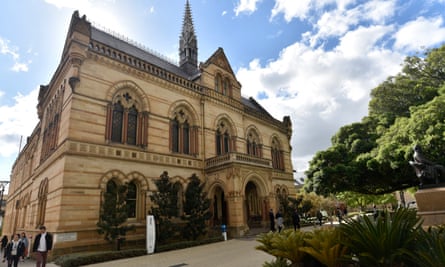I was supposed to end up slaughtering chickens at the local abattoir. We did not have mentors or ‘old boys’ or networks to open doors for us.

Last modified on Fri 9 Oct 2020 11.49 AEDT
I know Senator Jacqui Lambie is a controversial figure, but after scuttling the federal government’s refugee phone ban and now delivering a powerful speech on working-class kids, I am starting to warm up to her.
Her recent speech on the floor of the Senate opposing the government’s university changes because they would make it hard for working-class students to go to university resonated with me on so many levels.
I know because I was one of those working-class students she talked about.
I went to one of the poorest high schools in this country – Parafield Gardens high school. A school with no culture of students going on to tertiary education.
It was assumed, and accepted, by those around me that if you came from the northern suburbs of Adelaide, you would end up on the factory floor.
Completing Year 10 was the ceiling. You were then ushered into vocational training and then into a low-paid, insecure job behind a till or on a factory line (if you were lucky).
Universities did not bother with us.
We did not have mentors or “old boys” or networks to open doors for us, prop us up and set up connections for life.
I was supposed to end up slaughtering chickens at the local abattoir with my twin brother before moving up to a job with Holden’s Elizabeth plant – with my older brother.
But it is not just that society (teachers, politicians, universities) gave up on me, on us working0class kids, it could also be our own families.
Unlike most ethnic parents, my mother was never too keen on education because none of her working-class friends had kids in universities. She was constantly pushing me to get a job and stop dreaming about going to university – a concept so foreign and distant it was almost unimaginable to her.
She worked on the farms in regional South Australia, picking fruit, vegetables and tending vineyards because it was the only thing she could do – a peasant refugee war widow from communist Yugoslavia.
I remember, at the end of the day, she would sit at the kitchen table: tired, looking at her bruised hands, then at me, as if she were thinking “poor child, this is waiting for you, too”.
When you don’t have anyone in your family who went on to university or even completed high school, it makes it that much harder to believe in yourself.
And when you do make it to university and you have overcome all of this, then your struggles really begin.
I remember my first week at Adelaide University law school in 2007.
One of the well-groomed and dapper law students in my law of torts class asked me where I went to school, and I said Parafield Gardens. He furrowed his brow and asked “Where?” I said: “Northern suburbs of Adelaide.” He paused, eying me with suspicion, then said: “YOU got into Adelaide law?” I felt like I was in a scene from Legally Blonde.
That same week, another private school-educated student expressed distain at my presence in their cohort, saying “Oh, well the university dropped their standards these days, they allow anyone in.”
As a refugee, working class, union lawyer and a gay man I must be selective in my outrage because it is draining trying to fight against so much injustice out there.
Over the years I have come to realise one thing: that the distance between my world and Australia’s understanding of it is so vast because so few people from my Australia ever end up in law schools, on university grounds, or in echelons of power and beyond to tell our stories.
It is a distance I make shorter every time I enter the same spaces and sit at the same tables as my friends from more privileged backgrounds. These university changes will only make bridging this distance that much harder.
• Danijel Malbasa is a Melbourne-based industrial relations lawyer
No comments:
Post a Comment